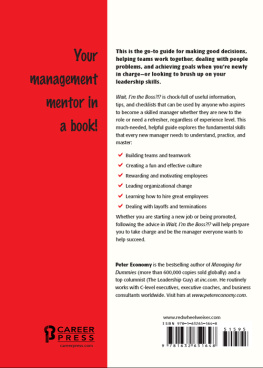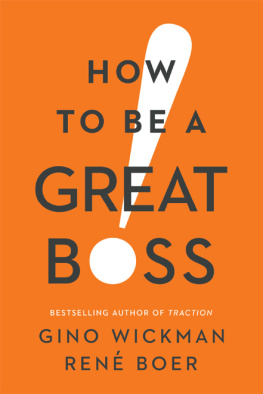
Table of Contents
Praise for Becoming a Better Boss
In a world of relentless change, one of the few sources of competitive advantage for companies is the quality of their management practices. Top executives are increasingly looking for ways to rethink their management processes and systems. In this book, Julian Birkinshaw suggests a complementary approach to push responsibility for rethinking management down to individual managers, and to help them find better ways of doing their job on an individual basis, one person at a time. Becoming a Better Boss is a revolutionary approach to management because it starts from the view of the person being managed, not the one doing the managing.
Gary Hamel, best-selling author and management thinker
We know the secret of long term success is more engaged employees. In this book Julian Birkinshaw shows how managers can do a much better job of fully engaging the people around them, so they can do their best work.
David MacLeod, author of The MacLeod Report to the UK Government, Engaging for Success
Great companies are defined by the quality of their managers. At Roche, we expect our managers to take a genuine interest in their people, to empower and trust them, and to exhibit integrity, courage and passion. This may sound straightforward, but its not it takes real effort and commitment to do these things on a sustained basis. In Becoming a Better Boss, Julian Birkinshaw provides a clear roadmap for how we can all become great managers.
Jayson Dallas, General Manager, Roche UK
Good leadership and management begins with good people management and its never been more important given the increasing diversity of the workforce and the ways in which we work. Julians book speaks to these challenges and is full of great case studies, models, and ideas about how to effectively manage and engage the workforce of today, and of the future, for leaders at all levels. As he has done so often on the topics of management, he is able to bring new perspectives and insights and deliver these in a highly readable and engaging way.
Peter Cheese, CEO, Chartered Institute of Personnel and Development
Julians new book is perhaps the worlds first discourse that looks at management from the eyes of the employees. With this simple yet path-breaking thought Birkinshaw ends up providing a practical roadmap for individuals to function effectively within an organization no matter how archaic/dysfunctional its structures or management machinery is.
Vineet Nayar, Vice Chairman, HCL Technologies
One of the hallmarks of a truly successful company is its ability to harness the talents and skills of its employees across the world. In this book, Julian Birkinshaw shows why so many companies struggle with this, and he offers practical advice to help managers at all levels be more effective at getting the most out of their people.
Ayman Asfari, CEO, Petrofac
This edition published 2013
2013 John Wiley & Sons, Ltd
Under the Jossey-Bass imprint, Jossey-Bass, 989 Market Street, San Francisco CA 94103-1741, USA
www.josseybass.com
Registered office
John Wiley and Sons Ltd, The Atrium, Southern Gate, Chichester, West Sussex, PO19 8SQ, United Kingdom
For details of our global editorial offices, for customer services and for information about how to apply for permission to reuse the copyright material in this book please see our website at www.wiley.com
All rights reserved. No part of this publication may be reproduced, stored in a retrieval system, or transmitted, in any form or by any means, electronic, mechanical, photocopying, recording or otherwise, except as permitted by the UK Copyright, Designs and Patents Act 1988, without the prior permission of the publisher.
Wiley publishes in a variety of print and electronic formats and by print-on-demand. Some material included with standard print versions of this book may not be included in e-books or in print-on-demand. If this book refers to media such as a CD or DVD that is not included in the version you purchased, you may download this material at http://booksupport.wiley.com. For more information about Wiley products, visit www.wiley.com
Designations used by companies to distinguish their products are often claimed as trademarks. All brand names and product names used in this book and on its cover are trade names, service marks, trademark or registered trademarks of their respective owners. The publisher and the book are not associated with any product or vendor mentioned in this book. None of the companies referenced within the book have endorsed the book.
Limit of Liability/Disclaimer of Warranty. While the publisher and author have used their best efforts in preparing this book, they make no representations or warranties with respect to the accuracy or completeness of the contents of this book and specifically disclaim any implied warranties of merchantability or fitness for a particular purpose. It is sold on the understanding that the publisher is not engaged in rendering professional services and neither the publisher nor the author shall be liable for damages arising herefrom. If professional advice or other expert assistance is required, the services of a competent professional should be sought.
A catalogue record for this book is available from the British Library.
ISBN 978-1-118-64546-8 (hardback) ISBN 978-1-118-65940-3 (ebk)
ISBN 978-1-118-65941-0 (ebk) ISBN 978-1-118-65942-7 (ebk)
Cover image: Linus Lohoff, www.linuslohoff.com
Cover design: rawshock design
This book is dedicated to all the bad bosses I have worked for.
I couldn't have written this book without your help.
Preface
I never expected to write this book. As a researcher and consultant, I had always focused my attention on the big challenges of strategy and structure that large organizations grapple with, leaving others to work on individual-level issues, such as how to motivate, influence, or develop others. However, over the last five years I have found myself drawn increasingly towards the nitty-gritty, practical challenges of how individuals actually get things done in large, complex organizations. It has been an enjoyable and surprising transition in my outlook on the world.
This journey of discovery began in 2006 when I founded the Management Innovation Lab (MLab) at London Business School with my colleague, Gary Hamel. The MLab mission was to accelerate the evolution of management, and our intention was to work closely with companies to design and run a series of management experiments that would help create new management practices and processes.
The MLab had some successes we facilitated some important initiatives in companies, we wrote up our insights and ideas in some influential publications, and we spoke about the importance of management innovation in events around the world. However, we weren't as successful as we would have liked to be, especially when it came to making change stick. On many occasions, we helped groups of mid-level managers design and implement management experiments: a new approach to innovation, a way of bringing customer experience into the workplace, an initiative for eliminating bureaucracy. Even though the experiments typically worked well, they rarely made it to the next step. Instead, the ideas were killed off by invisible forces of inertia.
It was an eye-opener for me to observe first-hand how little support these mid-level managers were getting for their management experiments. Many observers have said that companies should become better at trying out small-scale experiments, as a way of de-risking their change programs, but it turns out that these small-scale experiments don't actually make much of a difference: they overcome the corporate immune system's first line of defence, but there is typically a second and then a third line of defence as well.
Next page








